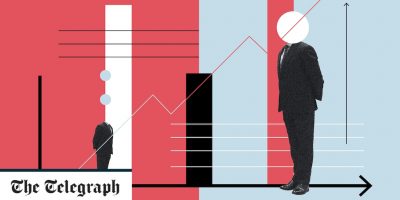We have finally seen the economic impact of the lockdown. A 20pc fall in the country’s economy over the three months to June – the largest drop ever recorded – and we are now technically in the dreaded R word: recession.
Investors will now naturally turn to safety and ask what markets will do next.
There are two ways to look at this recession, the country’s first since June 2009. Of course, long-term investors know that staying invested in stocks, even through a recession, will bear fruit. But that doesn’t mean investors can’t make short-term plays to either add ballast to their portfolio or make a few tactical changes to boost returns.
The first thing to assess is the recession itself: how long will it last? How bad will it be? On the face of it, a 20pc fall over three months is catastrophic. But the country was at a standstill for the majority of Q2, so it was expected. A sharp rise in the next quarter is likely, but after that we’re in a tough period. Our economic malaise could easily last as long as last time: 15 months.
So where should you invest? Look to the 2009 recession.
Times were simpler back then. Over that period stocks were generally bad – the best performing market was Japan which lost 6pc. British government bonds did a job as a safe haven and returned 10pc. Savers could have even made 5.5pc from cash, which outstripped 4.5pc inflation.
Investors even backed "safe" industries and made decent returns. Pharma stocks and tech businesses returned 15pc and 11pc respectively; even the oil giants only lost you 7.7pc, while the market lost 24pc on average.
But since 2009, central banks around the world have been printing money – known as quantitative easing – and this has distorted markets. This time around, investors must be savvier about both defending and boosting their portfolios.
One asset acting very differently this time around is gold, this year’s star performer. It lost 6pc during the last recession but the price was up 34pc as its peak last week since February.
Central banks are largely behind this, as is the weaker dollar which makes gold cheaper to buy. But the precious metal is prone to volatility and has lost 6pc this week alone. It will always be a relatively safe asset to diversify one’s portfolio and should not make up more than 10pc of savings.
Investors could add more as a short-term growth play. However, be wary of price drops like this week and accept that the majority of the profit has already been made.
Finding the hidden gem within British stocks is also more difficult now. The market is down 16pc and it is the worst performing region among its global peers. However, this encompasses Brexit uncertainty, a stronger pound versus the dollar and the index’s heavy weight to oil stocks.
Individual stocks will still make good returns – but building a portfolio of short-term winners will be nigh on impossible. It will still expose investors to significant amounts of risk and volatility and is unlikely to provide returns nor defence.
Central banks have helped investors in one way: because they pumped even more money into markets, to limit the impact of the pandemic, returns from government bonds have done investors well – up 4.4pc since February.
But for now, bonds issued by businesses, therefore riskier than government debt, could serve investors better.
The market dipped amid the carnage in February and March but has since recovered its losses and done so quicker than stock markets. Corporate bonds issued in sterling are up 2pc since February. Yields, while not fantastic, provide enough return for it to be a better risk/reward trade.
There will of course be bumps in the road, but highly rated corporate debt can offer security and small returns. Investors seeking more can venture down the credit ratings scale and use higher yields to boost returns.
One area that is a no-go this time around versus 2009 is cash. Yields from savings accounts are barely worth considering and inflation will erode it away.
Instead, shorter-term government bonds could be useful. The yield on these has risen recently as markets are unsure about the short-term economic outlook. This could provide a good entry point for a relatively safe investment yielding more than before.
Investors cannot expect an imitation of what did well in 2009. This time around the recession is of an entirely different nature, a global pandemic rather than a banking crisis. But there is more central bank money in the market and whether it’s gold, bonds or stocks, we have to learn what might do well in the near future.
























Comments